Nursing Reflection: Exploring Practice & Competency Standards
VerifiedAdded on 2020/05/08
|7
|993
|291
Journal and Reflective Writing
AI Summary
This nursing reflection paper explores the importance of reflective practice in the field of nursing, focusing on the Gibbs Reflective Cycle as a framework for analyzing experiences. The paper delves into the National Competency Standards for Enrolled Nurses, outlining key aspects such as professional and ethical practice, critical thinking, proper management of care, and collaboration within the healthcare team. A personal reflection is provided, describing the author's experiences throughout their nursing education, including feelings, evaluations, and analyses of their practice. The reflection highlights the importance of accountability, evidence-based practice, and patient confidentiality. The paper concludes with an action plan for continuous self-development, focusing on improving communication skills and interpersonal skills through structured activities and interactions with patients, their families, and senior nurses. The document includes references to support the reflection and the importance of reflective practice in nursing.
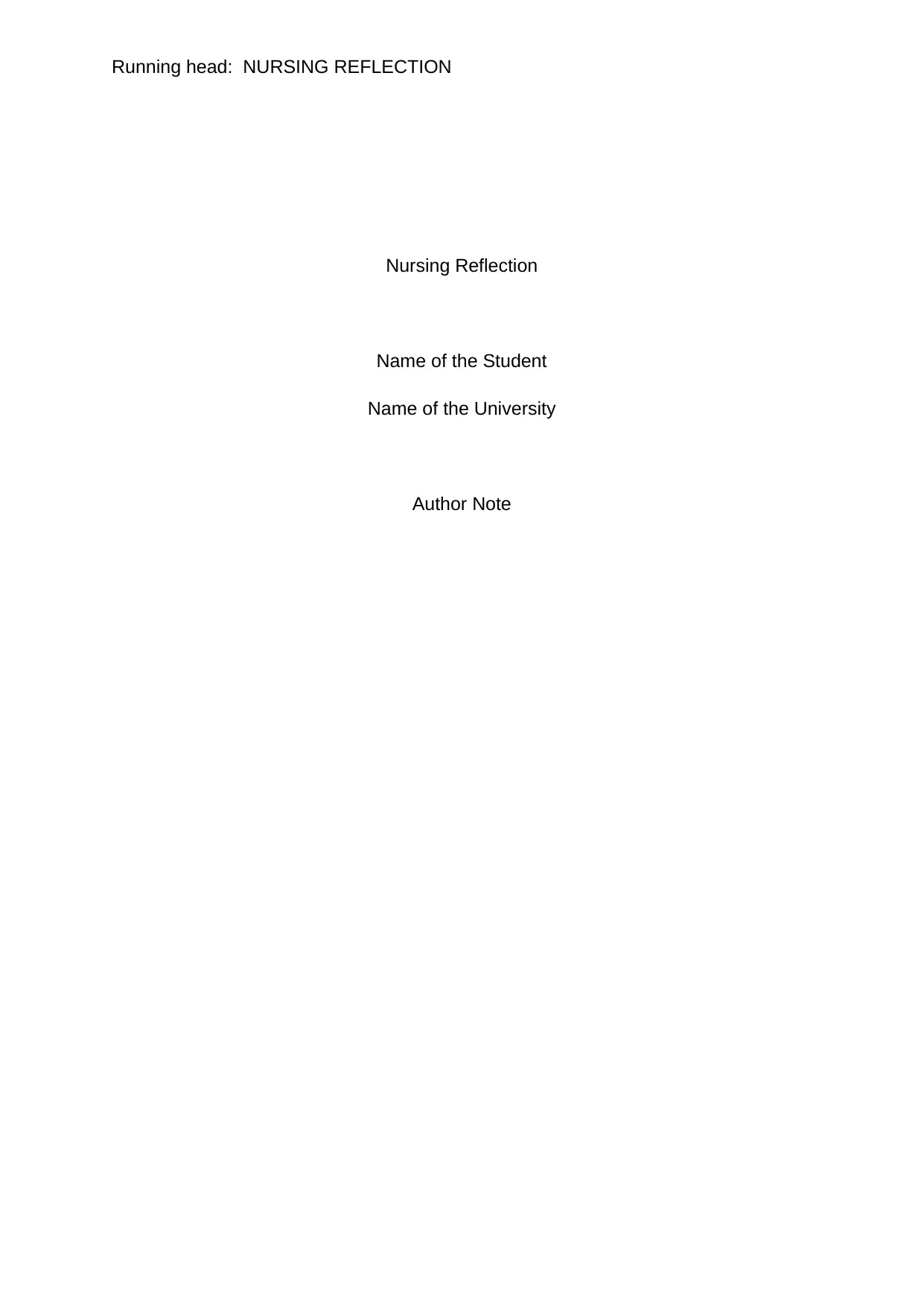
Running head: NURSING REFLECTION
Nursing Reflection
Name of the Student
Name of the University
Author Note
Nursing Reflection
Name of the Student
Name of the University
Author Note
Paraphrase This Document
Need a fresh take? Get an instant paraphrase of this document with our AI Paraphraser
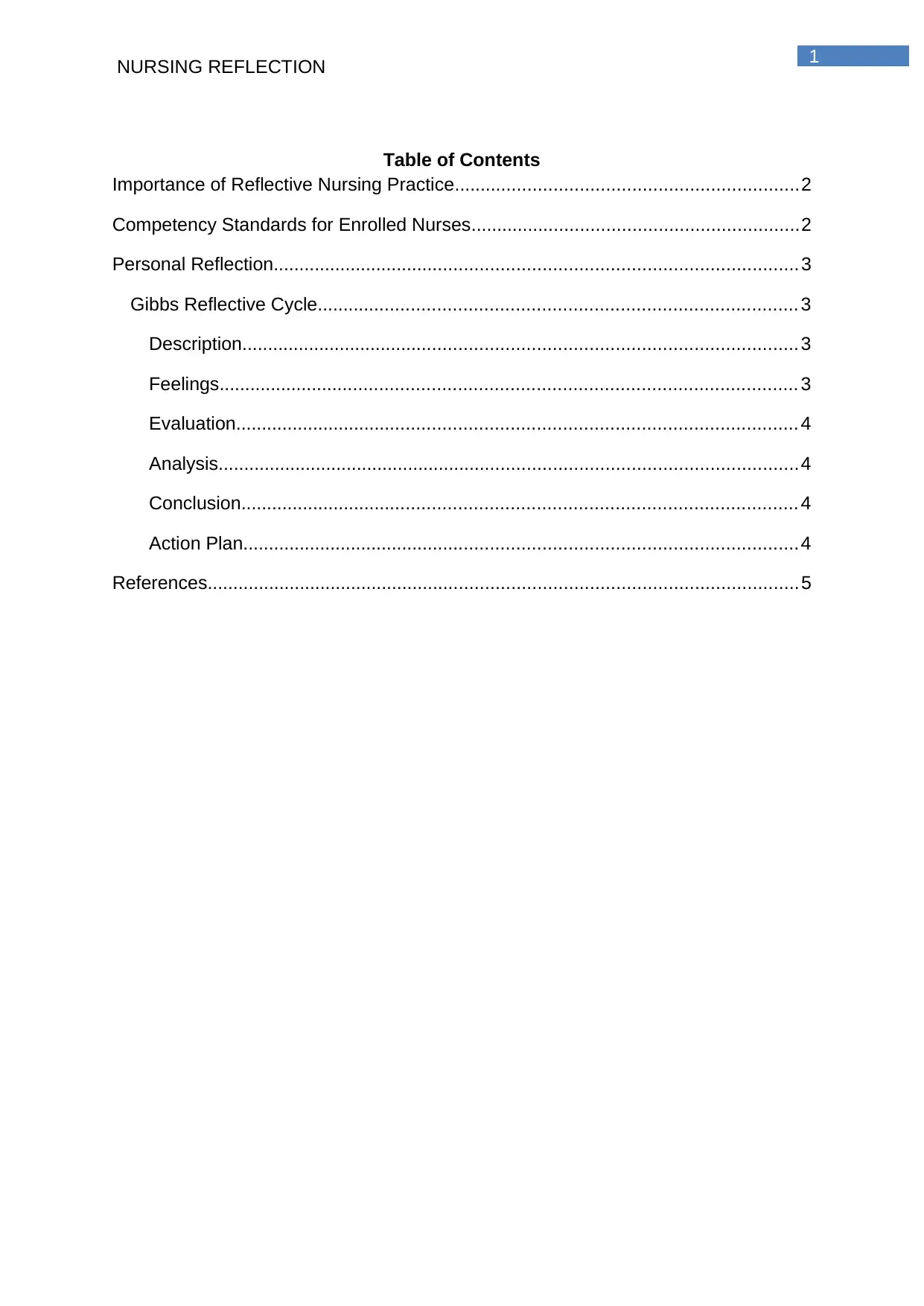
1
NURSING REFLECTION
Table of Contents
Importance of Reflective Nursing Practice..................................................................2
Competency Standards for Enrolled Nurses...............................................................2
Personal Reflection.....................................................................................................3
Gibbs Reflective Cycle............................................................................................ 3
Description...........................................................................................................3
Feelings............................................................................................................... 3
Evaluation............................................................................................................ 4
Analysis................................................................................................................4
Conclusion........................................................................................................... 4
Action Plan...........................................................................................................4
References..................................................................................................................5
NURSING REFLECTION
Table of Contents
Importance of Reflective Nursing Practice..................................................................2
Competency Standards for Enrolled Nurses...............................................................2
Personal Reflection.....................................................................................................3
Gibbs Reflective Cycle............................................................................................ 3
Description...........................................................................................................3
Feelings............................................................................................................... 3
Evaluation............................................................................................................ 4
Analysis................................................................................................................4
Conclusion........................................................................................................... 4
Action Plan...........................................................................................................4
References..................................................................................................................5
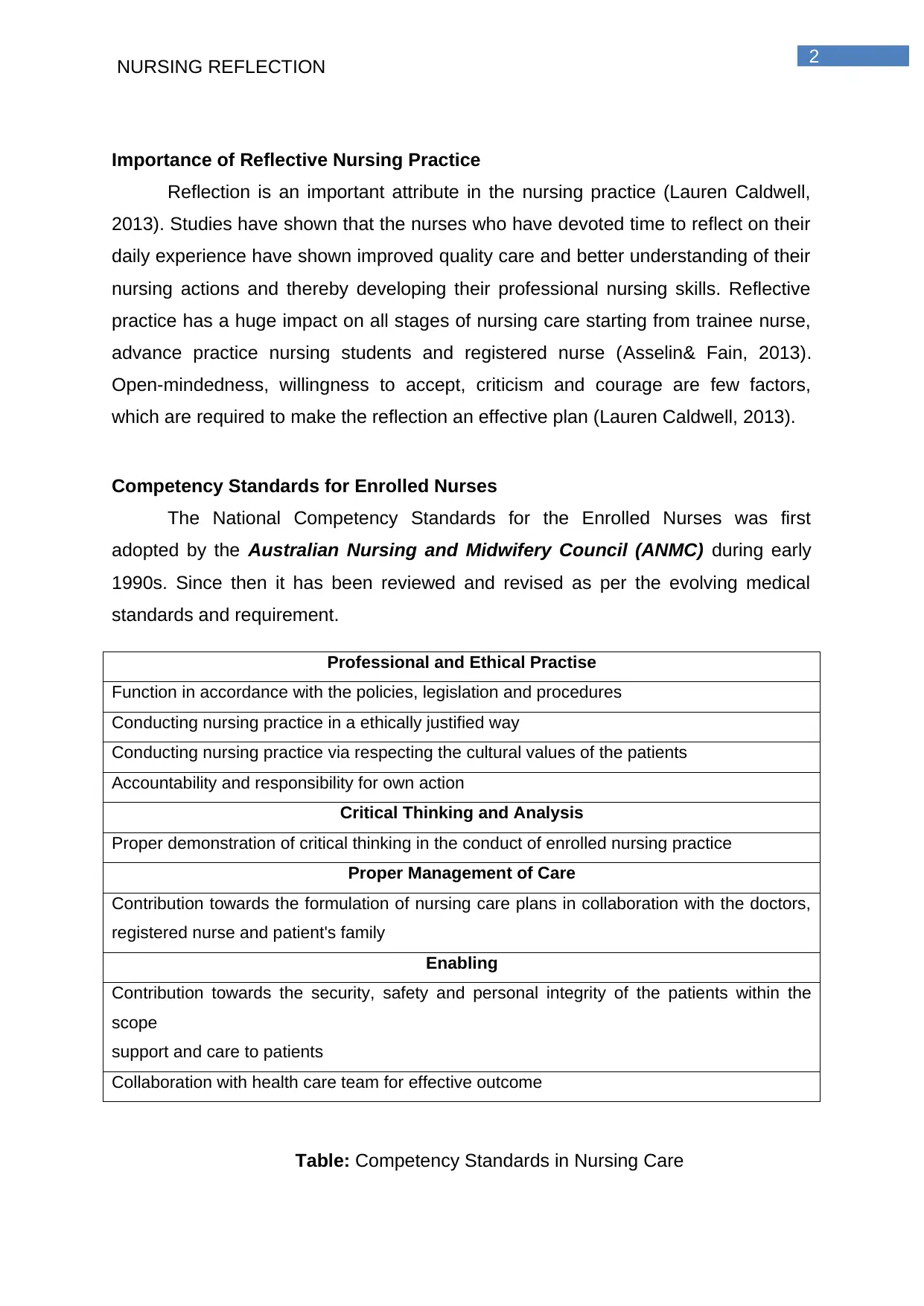
2
NURSING REFLECTION
Importance of Reflective Nursing Practice
Reflection is an important attribute in the nursing practice (Lauren Caldwell,
2013). Studies have shown that the nurses who have devoted time to reflect on their
daily experience have shown improved quality care and better understanding of their
nursing actions and thereby developing their professional nursing skills. Reflective
practice has a huge impact on all stages of nursing care starting from trainee nurse,
advance practice nursing students and registered nurse (Asselin& Fain, 2013).
Open-mindedness, willingness to accept, criticism and courage are few factors,
which are required to make the reflection an effective plan (Lauren Caldwell, 2013).
Competency Standards for Enrolled Nurses
The National Competency Standards for the Enrolled Nurses was first
adopted by the Australian Nursing and Midwifery Council (ANMC) during early
1990s. Since then it has been reviewed and revised as per the evolving medical
standards and requirement.
Professional and Ethical Practise
Function in accordance with the policies, legislation and procedures
Conducting nursing practice in a ethically justified way
Conducting nursing practice via respecting the cultural values of the patients
Accountability and responsibility for own action
Critical Thinking and Analysis
Proper demonstration of critical thinking in the conduct of enrolled nursing practice
Proper Management of Care
Contribution towards the formulation of nursing care plans in collaboration with the doctors,
registered nurse and patient's family
Enabling
Contribution towards the security, safety and personal integrity of the patients within the
scope
support and care to patients
Collaboration with health care team for effective outcome
Table: Competency Standards in Nursing Care
NURSING REFLECTION
Importance of Reflective Nursing Practice
Reflection is an important attribute in the nursing practice (Lauren Caldwell,
2013). Studies have shown that the nurses who have devoted time to reflect on their
daily experience have shown improved quality care and better understanding of their
nursing actions and thereby developing their professional nursing skills. Reflective
practice has a huge impact on all stages of nursing care starting from trainee nurse,
advance practice nursing students and registered nurse (Asselin& Fain, 2013).
Open-mindedness, willingness to accept, criticism and courage are few factors,
which are required to make the reflection an effective plan (Lauren Caldwell, 2013).
Competency Standards for Enrolled Nurses
The National Competency Standards for the Enrolled Nurses was first
adopted by the Australian Nursing and Midwifery Council (ANMC) during early
1990s. Since then it has been reviewed and revised as per the evolving medical
standards and requirement.
Professional and Ethical Practise
Function in accordance with the policies, legislation and procedures
Conducting nursing practice in a ethically justified way
Conducting nursing practice via respecting the cultural values of the patients
Accountability and responsibility for own action
Critical Thinking and Analysis
Proper demonstration of critical thinking in the conduct of enrolled nursing practice
Proper Management of Care
Contribution towards the formulation of nursing care plans in collaboration with the doctors,
registered nurse and patient's family
Enabling
Contribution towards the security, safety and personal integrity of the patients within the
scope
support and care to patients
Collaboration with health care team for effective outcome
Table: Competency Standards in Nursing Care
⊘ This is a preview!⊘
Do you want full access?
Subscribe today to unlock all pages.

Trusted by 1+ million students worldwide
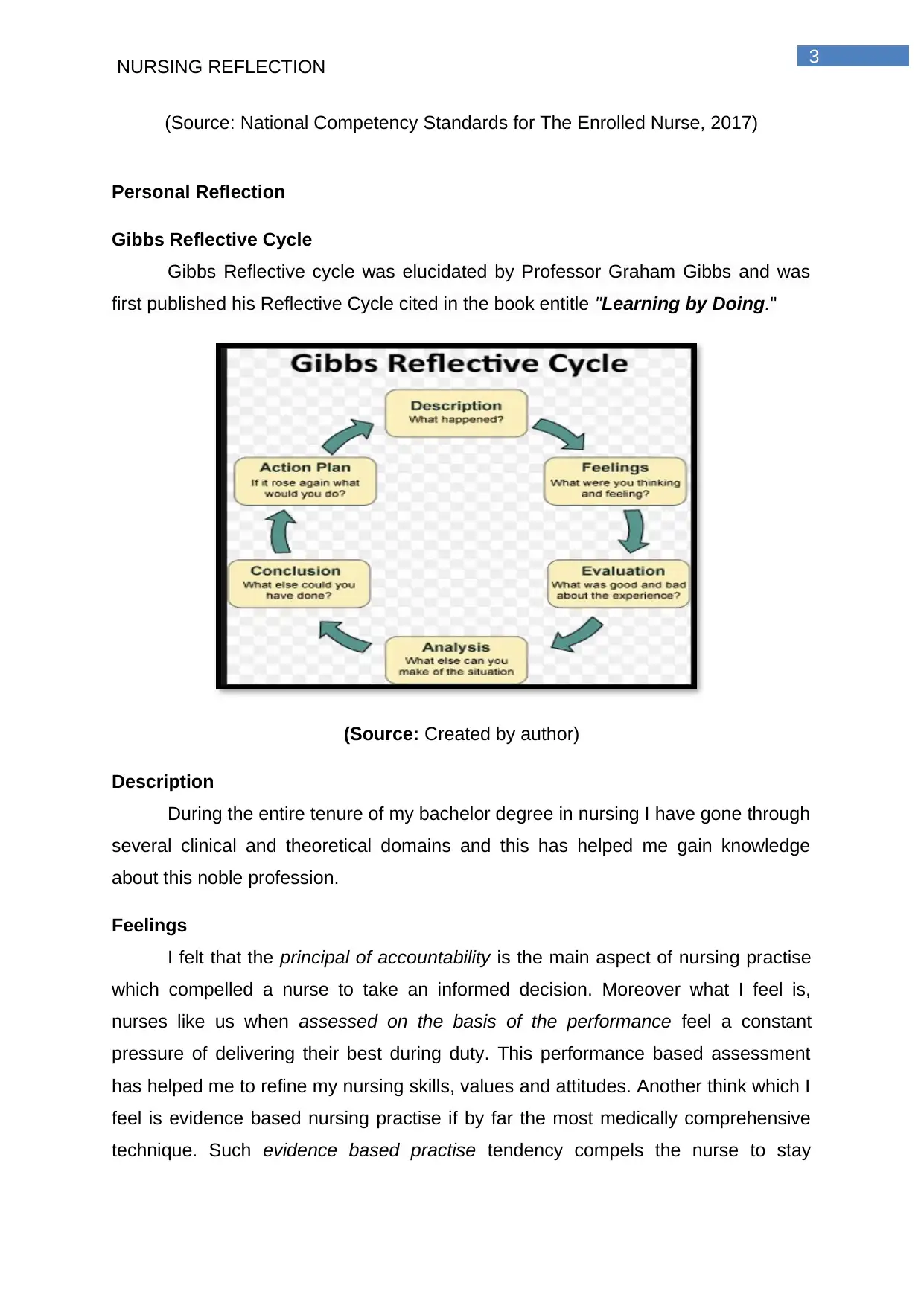
3
NURSING REFLECTION
(Source: National Competency Standards for The Enrolled Nurse, 2017)
Personal Reflection
Gibbs Reflective Cycle
Gibbs Reflective cycle was elucidated by Professor Graham Gibbs and was
first published his Reflective Cycle cited in the book entitle "Learning by Doing."
(Source: Created by author)
Description
During the entire tenure of my bachelor degree in nursing I have gone through
several clinical and theoretical domains and this has helped me gain knowledge
about this noble profession.
Feelings
I felt that the principal of accountability is the main aspect of nursing practise
which compelled a nurse to take an informed decision. Moreover what I feel is,
nurses like us when assessed on the basis of the performance feel a constant
pressure of delivering their best during duty. This performance based assessment
has helped me to refine my nursing skills, values and attitudes. Another think which I
feel is evidence based nursing practise if by far the most medically comprehensive
technique. Such evidence based practise tendency compels the nurse to stay
NURSING REFLECTION
(Source: National Competency Standards for The Enrolled Nurse, 2017)
Personal Reflection
Gibbs Reflective Cycle
Gibbs Reflective cycle was elucidated by Professor Graham Gibbs and was
first published his Reflective Cycle cited in the book entitle "Learning by Doing."
(Source: Created by author)
Description
During the entire tenure of my bachelor degree in nursing I have gone through
several clinical and theoretical domains and this has helped me gain knowledge
about this noble profession.
Feelings
I felt that the principal of accountability is the main aspect of nursing practise
which compelled a nurse to take an informed decision. Moreover what I feel is,
nurses like us when assessed on the basis of the performance feel a constant
pressure of delivering their best during duty. This performance based assessment
has helped me to refine my nursing skills, values and attitudes. Another think which I
feel is evidence based nursing practise if by far the most medically comprehensive
technique. Such evidence based practise tendency compels the nurse to stay
Paraphrase This Document
Need a fresh take? Get an instant paraphrase of this document with our AI Paraphraser
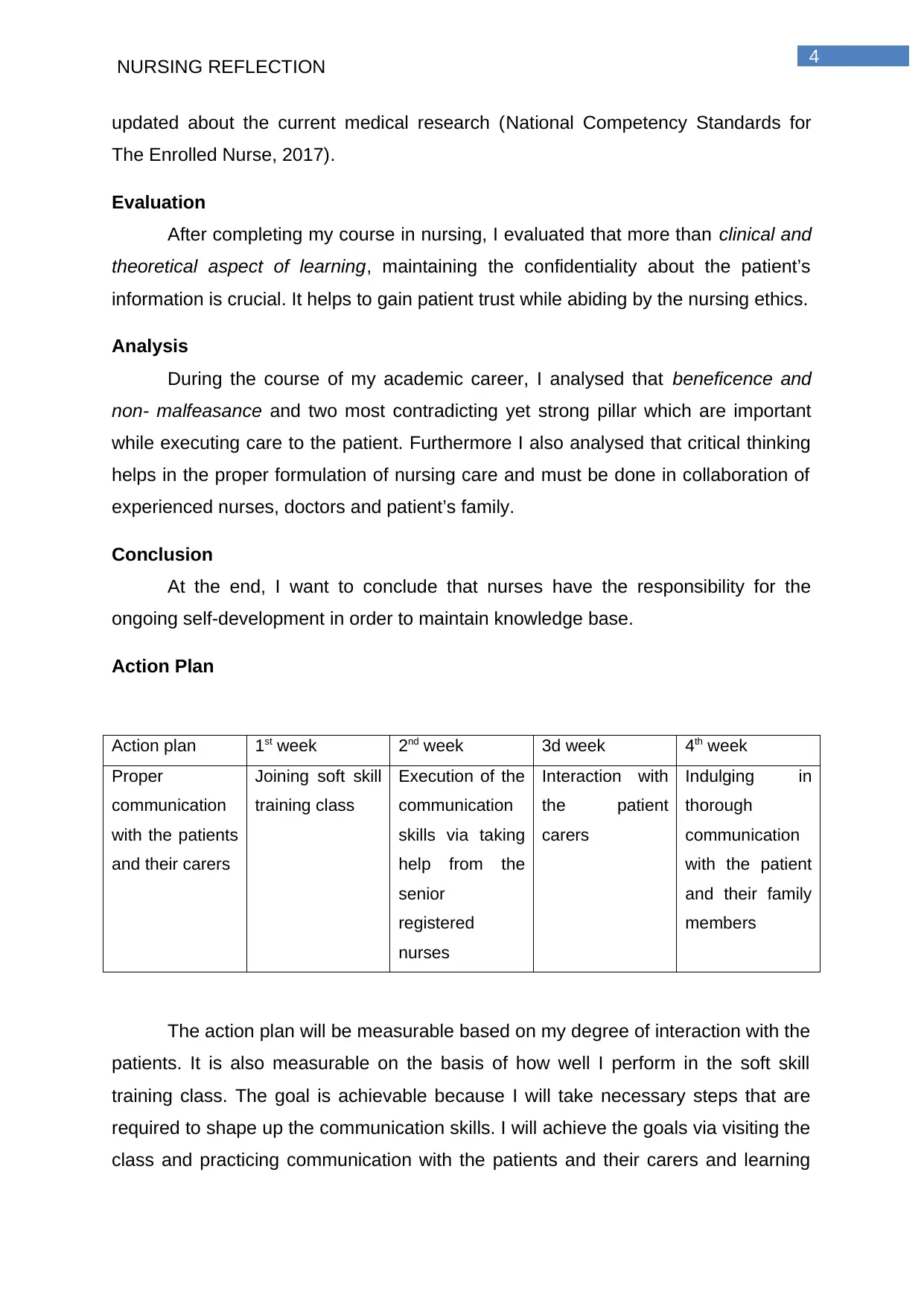
4
NURSING REFLECTION
updated about the current medical research (National Competency Standards for
The Enrolled Nurse, 2017).
Evaluation
After completing my course in nursing, I evaluated that more than clinical and
theoretical aspect of learning, maintaining the confidentiality about the patient’s
information is crucial. It helps to gain patient trust while abiding by the nursing ethics.
Analysis
During the course of my academic career, I analysed that beneficence and
non- malfeasance and two most contradicting yet strong pillar which are important
while executing care to the patient. Furthermore I also analysed that critical thinking
helps in the proper formulation of nursing care and must be done in collaboration of
experienced nurses, doctors and patient’s family.
Conclusion
At the end, I want to conclude that nurses have the responsibility for the
ongoing self-development in order to maintain knowledge base.
Action Plan
Action plan 1st week 2nd week 3d week 4th week
Proper
communication
with the patients
and their carers
Joining soft skill
training class
Execution of the
communication
skills via taking
help from the
senior
registered
nurses
Interaction with
the patient
carers
Indulging in
thorough
communication
with the patient
and their family
members
The action plan will be measurable based on my degree of interaction with the
patients. It is also measurable on the basis of how well I perform in the soft skill
training class. The goal is achievable because I will take necessary steps that are
required to shape up the communication skills. I will achieve the goals via visiting the
class and practicing communication with the patients and their carers and learning
NURSING REFLECTION
updated about the current medical research (National Competency Standards for
The Enrolled Nurse, 2017).
Evaluation
After completing my course in nursing, I evaluated that more than clinical and
theoretical aspect of learning, maintaining the confidentiality about the patient’s
information is crucial. It helps to gain patient trust while abiding by the nursing ethics.
Analysis
During the course of my academic career, I analysed that beneficence and
non- malfeasance and two most contradicting yet strong pillar which are important
while executing care to the patient. Furthermore I also analysed that critical thinking
helps in the proper formulation of nursing care and must be done in collaboration of
experienced nurses, doctors and patient’s family.
Conclusion
At the end, I want to conclude that nurses have the responsibility for the
ongoing self-development in order to maintain knowledge base.
Action Plan
Action plan 1st week 2nd week 3d week 4th week
Proper
communication
with the patients
and their carers
Joining soft skill
training class
Execution of the
communication
skills via taking
help from the
senior
registered
nurses
Interaction with
the patient
carers
Indulging in
thorough
communication
with the patient
and their family
members
The action plan will be measurable based on my degree of interaction with the
patients. It is also measurable on the basis of how well I perform in the soft skill
training class. The goal is achievable because I will take necessary steps that are
required to shape up the communication skills. I will achieve the goals via visiting the
class and practicing communication with the patients and their carers and learning
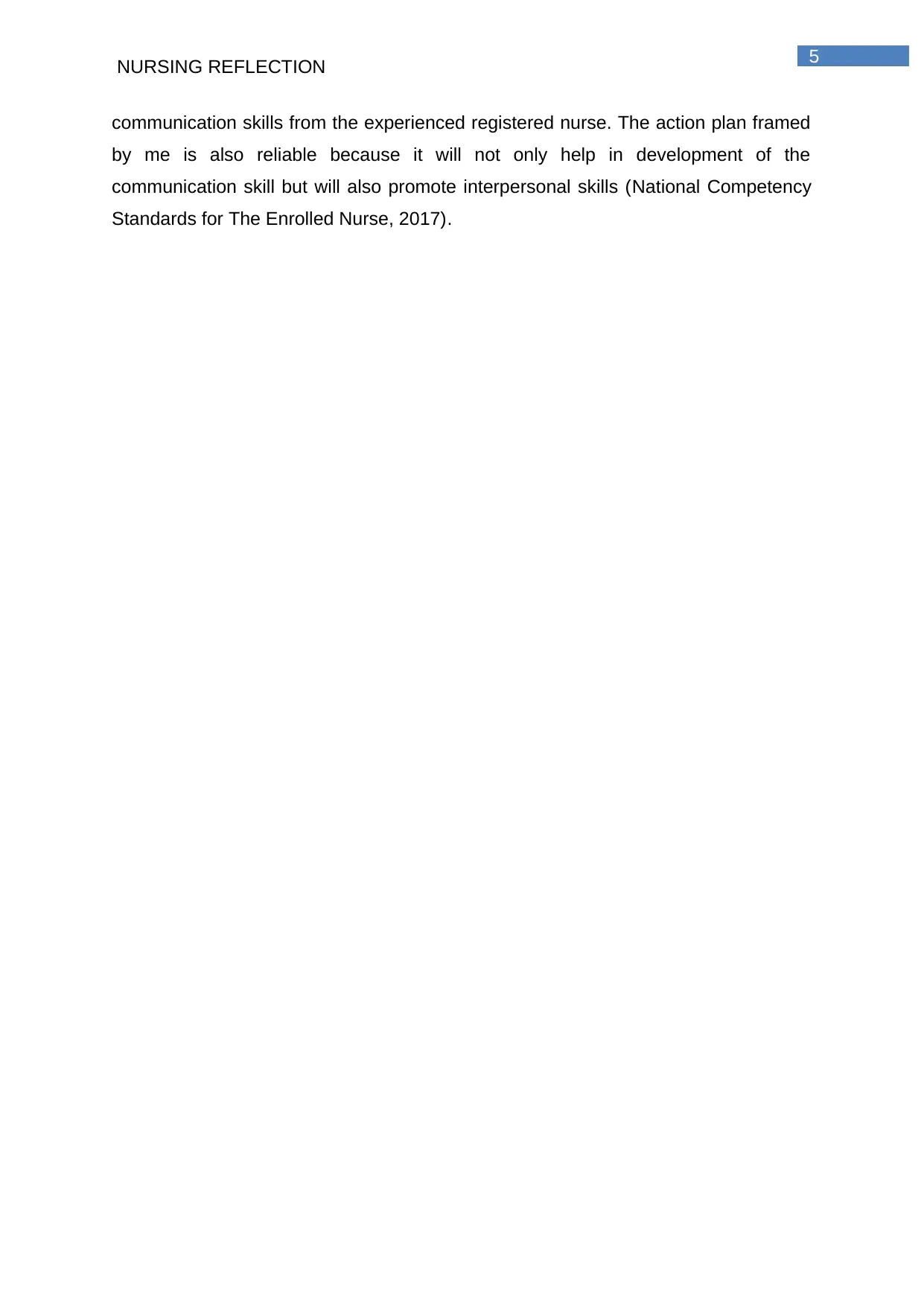
5
NURSING REFLECTION
communication skills from the experienced registered nurse. The action plan framed
by me is also reliable because it will not only help in development of the
communication skill but will also promote interpersonal skills (National Competency
Standards for The Enrolled Nurse, 2017).
NURSING REFLECTION
communication skills from the experienced registered nurse. The action plan framed
by me is also reliable because it will not only help in development of the
communication skill but will also promote interpersonal skills (National Competency
Standards for The Enrolled Nurse, 2017).
⊘ This is a preview!⊘
Do you want full access?
Subscribe today to unlock all pages.

Trusted by 1+ million students worldwide
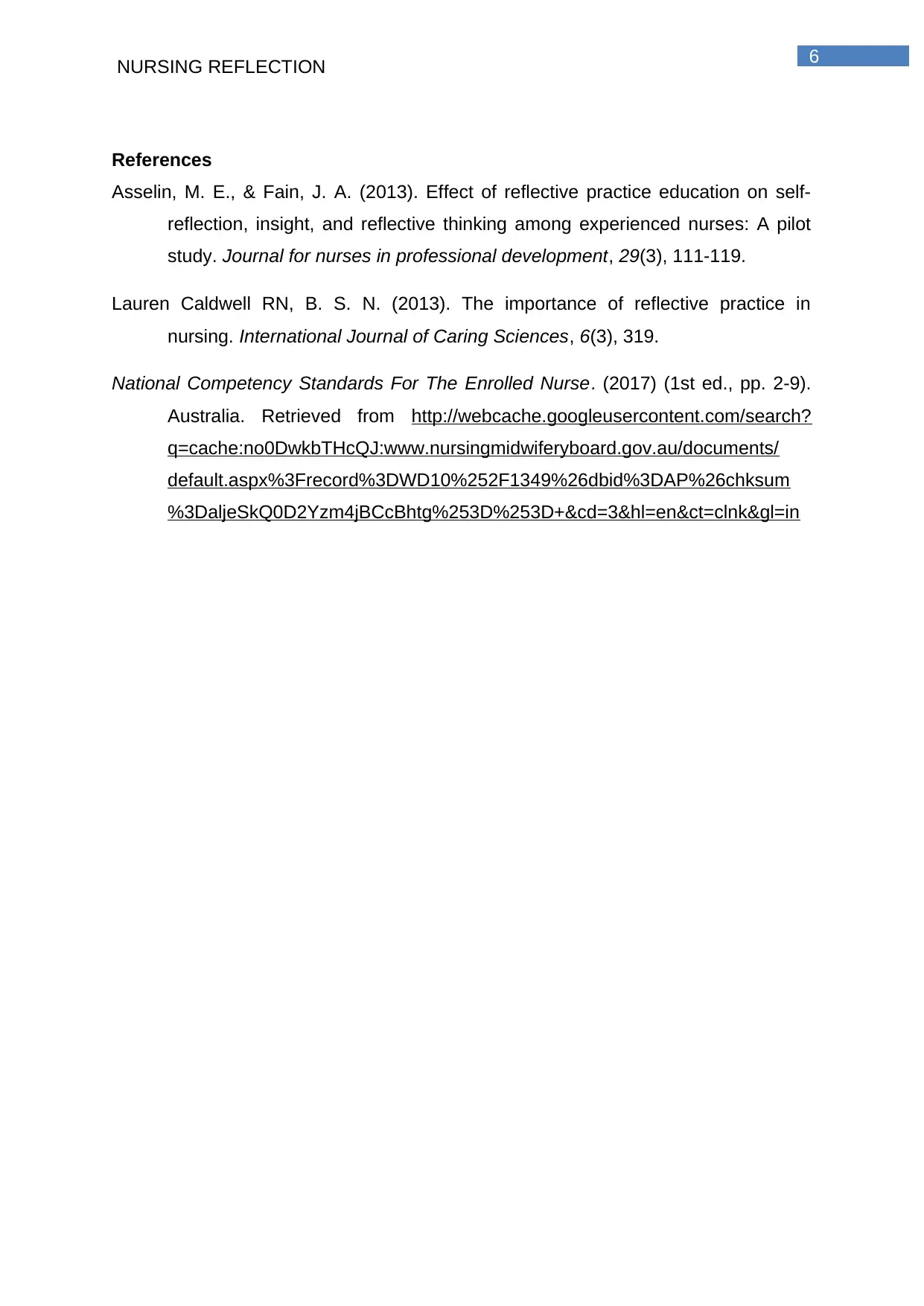
6
NURSING REFLECTION
References
Asselin, M. E., & Fain, J. A. (2013). Effect of reflective practice education on self-
reflection, insight, and reflective thinking among experienced nurses: A pilot
study. Journal for nurses in professional development, 29(3), 111-119.
Lauren Caldwell RN, B. S. N. (2013). The importance of reflective practice in
nursing. International Journal of Caring Sciences, 6(3), 319.
National Competency Standards For The Enrolled Nurse. (2017) (1st ed., pp. 2-9).
Australia. Retrieved from http://webcache.googleusercontent.com/search?
q=cache:no0DwkbTHcQJ:www.nursingmidwiferyboard.gov.au/documents/
default.aspx%3Frecord%3DWD10%252F1349%26dbid%3DAP%26chksum
%3DaljeSkQ0D2Yzm4jBCcBhtg%253D%253D+&cd=3&hl=en&ct=clnk&gl=in
NURSING REFLECTION
References
Asselin, M. E., & Fain, J. A. (2013). Effect of reflective practice education on self-
reflection, insight, and reflective thinking among experienced nurses: A pilot
study. Journal for nurses in professional development, 29(3), 111-119.
Lauren Caldwell RN, B. S. N. (2013). The importance of reflective practice in
nursing. International Journal of Caring Sciences, 6(3), 319.
National Competency Standards For The Enrolled Nurse. (2017) (1st ed., pp. 2-9).
Australia. Retrieved from http://webcache.googleusercontent.com/search?
q=cache:no0DwkbTHcQJ:www.nursingmidwiferyboard.gov.au/documents/
default.aspx%3Frecord%3DWD10%252F1349%26dbid%3DAP%26chksum
%3DaljeSkQ0D2Yzm4jBCcBhtg%253D%253D+&cd=3&hl=en&ct=clnk&gl=in
1 out of 7
Related Documents
Your All-in-One AI-Powered Toolkit for Academic Success.
+13062052269
info@desklib.com
Available 24*7 on WhatsApp / Email
![[object Object]](/_next/static/media/star-bottom.7253800d.svg)
Unlock your academic potential
Copyright © 2020–2026 A2Z Services. All Rights Reserved. Developed and managed by ZUCOL.





